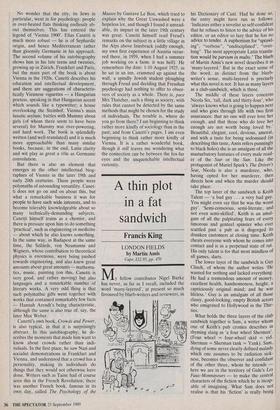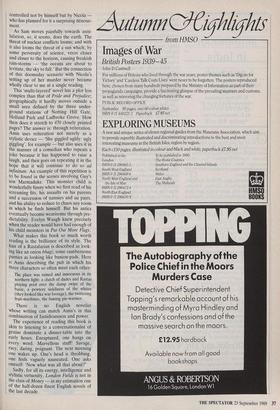A thin plot in a fat sandwich
Francis King
LONDON FIELDS by Martin Amis Cape, £12.95, pp. 470 My fellow contributor Nigel Burke has never, as far as I recall, included the word 'many-layered', at present so much favoured by blurb-writers and reviewers, in his Dictionary of Cant. Had he done so, the entry might have run as follows: 'Indicates either a novelist so self-confident that he refuses to listen to the advice of his editor, or an editor so lazy that he has no advice to tender. A euphemism for "sprawl- ing", "verbose", "undisciplined", "over- long". The most appropriate Latin transla- tion would be parvum in multo.' The blurb of Martin Amis's new novel describes it as 'many-layered.' But in the exact sense of the word, as distinct from the blurb- writer's sense, multi-layered is precisely what this novel is not. It has as many layers as a club-sandwich, which is three.
The middle of these layers concerns Nicola Six, 'tall, dark and thirty-four', who 'always knows what is going to happen next and who goes through life with two firm assurances: that no one will ever love her enough, and that those who do love her enough are not worth being loved by.' Beautiful, elegant, cool, devious, amoral, and with a taste for being sodomised (in describing this taste, Amis refers punningly to black holes) she is an amalgam of all the masturbatory fantasies of every male read- er of the Star or the Sun. Like the protagonist of Muriel Spark's The Driver's Seat, Nicola is also a murderee, who, having opted for her murderer, then directs how and when the murder should take place.
The top layer of the sandwich is Keith Talent — 'a bad guy ... a very bad guy. You might even say that he was the worst guy'. 'Semi-conscious, semi-literate, and not even semi-skilled', Keith is an amal- gam of all the palpitating fears of ever)' timorous and genteel spinster who ever scuttled past a pub as it disgorged its drunken customers at closing time. Keith cheats everyone with whom he comes into contact and is in a perpetual state of rut. His only talent is for that most mindless of all games, darts.
The lower layer of the sandwich is Guy Clinch, of whom the author writes 'He wanted for nothing and lacked everything. He had a tremendous amount of money, excellent health, handsomeness, height, a capriciously original mind; and he was lifeless.' Guy is an amalgam of all those classy, good-looking, empty British actors who emigrated to Hollywood in the Thir- ties.
What holds the three layers of the club sandwich together is Sam, a writer whom one of Keith's pub cronies describes in rhyming slang as 'a four wheel Sherman'. (Four wheel = four-wheel skid = yid. Sherman = Sherman tank = Yank). Sam, dying of some never clearly defined malady which one assumes to be radiation sick- ness, becomes the observer and confidant of the other three, whom he intends — here we are in the territory of Gide's Les Faux-Monnayeurs — to make the central characters of the fiction which he is incap- able of imagining. What Sam does not realise is that his 'fiction' is really being
controlled not by himself but by Nicola — who has planned for it a surprising dénoue- ment.
As Sam moves painfully towards anni- hilation, so, it seems, does the earth. The threat of nuclear conflicts looms; and with it also looms the threat of a sun which, by some perversity of science, veers closer and closer to the horizon, causing freakish rain-storms — 'the oceans are about to levitate, the sky to fall.' But the connection of this doomsday scenario with Nicola's setting up of her murder never became wholly clear to me at a single reading.
This 'multi-layered' novel has a plot less complex than that of Pride and Prejudice; geographically it hardly moves outside a small area defined by the three under- ground stations of Notting Hill Gate, Holland Park and Ladbroke Grove. How then does it stretch to 470 closely printed pages? The answer is: through reiteration. Amis uses reiteration not merely as a Stylistic device — 'She giggled uglily: ugly giggling', for example — but also uses it in the manner of a comedian who repeats a joke because it has happened to raise a laugh, and then goes on repeating it in the hope that it will continue to do so ad infinitum. An example of this repetition is to be found in the scenes involving Guy's son Marmaduke. This monster child is wonderfully funny when we first read of his screaming fits, his assaults on his parents and a succession of nannies and au pairs, and his ability to reduce to chaos any room in which he finds himself. But his antics eventually become wearisome through pre- dictability. Evelyn Waugh knew precisely when the reader would have had enough of his child monsters in Put Out More Flags.
What makes this book so much worth reading is the brilliance of its style. The hair of a Rastafarian is described as look- ing like an onion bhagi; some cumbersome panties as looking like bunion-pads. Here is Amis describing the pub in which his three characters so often meet each other:
The place was ruined and innocuous in its northern light: a clutch of dudes and Rastas playing pool over the damp swipe of the baize, a pewtery sickliness of the whites (they looked like war footage), the twittering fruit-machines, the fuming pie-warmer.
There is no English novelist Whose writing can match Amis's in this combination of fastidiousness and power.
The experience of reading this book is akin to listening to a conversationalist of genius dominate a dinner-table into the early hours. Enraptured, one hangs on every word. Marvellous stuff! Savage, racy, daring, poignant. The next morning one wakes up. One's head is throbbing, one feels vaguely nauseated. One asks oneself: 'Now what was all that about?'
Sadly, for all its energy, intelligence and stylistic virtuosity, London Fields is not in the class of Money — in my estimation one of the half-dozen finest English novels of the last decade.



























































 Previous page
Previous page